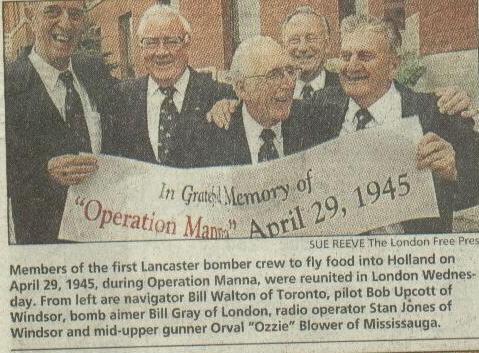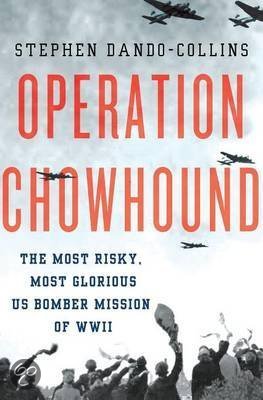Bob Upcott
 Early in the
morning of the April 28th 1945, my crew and I were briefed together with
another crew, that had an Australian pilot. Our Lancaster's were at that moment
the only two bombers on Ludford Manga airfield, that didn't have secret
radio-equipment installed. Normally our squadron would send bombers on their
mission to fly with other squadrons that were on their way to targets over the
continent. Our aircraft had an extra crew member on board, this crew member
could speak, or at least understand German and while in the air with the other
bombers on a mission, he would scan the frequencies with his radio-equipment an
when he came across a frequency that was used by the Germans, he would send out
a jam signal.
Early in the
morning of the April 28th 1945, my crew and I were briefed together with
another crew, that had an Australian pilot. Our Lancaster's were at that moment
the only two bombers on Ludford Manga airfield, that didn't have secret
radio-equipment installed. Normally our squadron would send bombers on their
mission to fly with other squadrons that were on their way to targets over the
continent. Our aircraft had an extra crew member on board, this crew member
could speak, or at least understand German and while in the air with the other
bombers on a mission, he would scan the frequencies with his radio-equipment an
when he came across a frequency that was used by the Germans, he would send out
a jam signal.
This time we were send on a very different kind of mission.
We learned at the briefing that our bombers had been filled with food, and that
we were going to drop it over Holland. The ground personnel had pulled all the
food in through the bomb-bay. They climbed through a small opening of the bomb
doors and simply stacked the food on the bomb doors.

We learned that we were going to make a test-run. The Allied and German commanders had negotiated over a truce to allow the food drops for the last couple of days, but had not been able to reach an agreement. The Germans held off. The RAF decided that it didn't want to wait for the truce to be effective and called for a test-run, to test the German reactions to the low flying Lancaster's.
Our two bombers had to fly through a corridor that the Germans had prescribed. If our mission was a success and we could drop our food without being shot at, operation Manna would be launched. The weather was really bad on that morning of the 28th. We weren't able to get our heavily loaded bombers of the ground and the mission was postponed. The clouts began to break early in the morning of the next day, April 29th and we took off. When had crossed the Channel flying only on our instruments because it was still misty. When we came over the continent however the weather was clear there and we could now see what we were doing.

Bob Upcott’s entry in his logbook on his first Manna Mission op April 29th (picture Dennis Whitehead).
When we passed the Dutch coast we saw anti-aircraft guns that pointed their nuzzles in our direction. We even saw tanks that tried to keep their masterpiece on us. We were looking right down a number of barrels. All the guns were still manned and they didn't have reason to do otherwise since the war was still going on at that time. We were very lucky that they all kept their fire. We were however hit by small arms fire. We didn't know this right away. When we had returned from our mission, the ground personnel discovered that a 9 mm pistol had slung a small hole on the right side of the aircraft, near the tail.We saw very few people on this first mission. Nobody knew that we were coming, so the civilians were not yet prepared to welcome us as they would be later. Then we saw the Racetrack Duindigt. This was our drop zone for the day. We could fly in directly, without circling around. The Australian pilot was on my port side, flying echelon port. I dropped first when we were over the racetrack, while the Australian dropped almost that same moment. I had waited a little bit to long with the drop, because I partly overshot the drop zone. Half of the load slammed into the bleaches on the end of the racecourse. I hadn't noticed that my load had dropped on the wrong place, until a Dutchman told me forty years later that he had seen the two Lancasters drop on that first day. He happened to be on the Racecourse that moment and he saw the first bomber dropping to late. That could only have been me.
The first part of the mission had been a success, now we only had to follow the corridor back to the North Sea and we were on our way home. The second part of the mission didn't provide any problems. As soon as we had left the continent and were back over the Nord Sea, our radio operator transmitted the message to our base that the mission had been successful. Around noon that day the BBC broadcast the news that operation Manna was going to be effective the same day. Two hundred Lancasters would appear over Holland at two o'clock that day to bring their food to the starving population of Holland. The Dutch population reacted en mass on this news. When the Bombers flew over the Dutch landscape they were waved at by many civilians.
Bill Gray was the Bomb Aimer on Bob Upcott's crew on the Bad Penny.
His nephew created a website with more information about Bill Gray's food drop missions.

 Author: Hans Onderwater This book by Hans Onderwater is the standard work about the food drop missions over Occupied Holland with a bundle of information, photos and first hand accounts of the hunger winter and the food drop missions.
Author: Hans Onderwater This book by Hans Onderwater is the standard work about the food drop missions over Occupied Holland with a bundle of information, photos and first hand accounts of the hunger winter and the food drop missions.